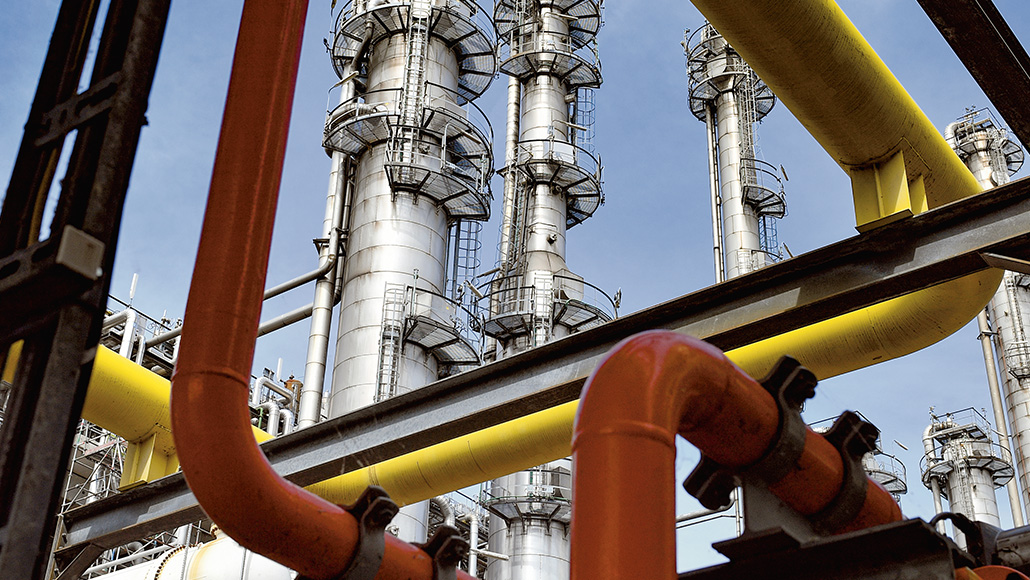Business and property
Chemicals
Our plants produce a range of base chemicals, including ethylene, propylene and aromatics, and intermediate chemicals such as styrene monomer, propylene oxide, solvents, detergent alcohols, ethylene oxide and ethylene glycol. We have the capacity to produce around 8.1 million tonnes of ethylene a year (including the Shell share of capacity entitlement (offtake rights) of joint ventures and associates, which may be different from nominal equity interest). We are expanding our product portfolio to include sustainable chemicals made from bio-based and circular feedstocks, more intermediates and performance chemicals such as polyethylene and polycarbonate. We operate chemical plants worldwide and have a global balance of locations, feedstocks and products that allows us to seize commercial opportunities and withstand cycles of lower margins.
Shell Chemicals is transforming and has integrated further with Refining. In addition to our standalone, chemicals-only production sites, we are transforming our refineries into energy and chemicals parks. We expect this to happen at the following sites: Norco in the USA, Scotford in Canada, Pernis in the Netherlands, Rheinland in Germany and Pulau Bukom in Singapore. We are also exploring options for the former Convent Refinery in Louisiana, USA, which is currently shut down, and may turn it into a low-carbon fuels facility. The energy and chemicals parks are expected to focus more on meeting customers’ low-carbon and sustainability needs.
In 2022, we supplied more than 12 million tonnes of petrochemicals to more than 1,000 industrial customers worldwide. Products made from chemicals are used in everyday life in medical equipment, construction, transport, electronics, agriculture and sports. As global demand for chemicals increases, we plan to increase the size of our business, by understanding and responding to our customers’ needs.
Products – Refining & Trading
Refining
We have interests in eight refineries worldwide, with a capacity to process a total of 1.7 million barrels of crude oil per day. The distribution of our refining capacity is 60% in Europe, 26% in the Americas and 14% in Asia.
Shell Refining is transforming. We are concentrating our refineries portfolio to meet our strategic aims and to capitalise on the strong integration between our customers, trading operations, chemical plants and, increasingly, our low-carbon fuels output. We are transforming our refining sites into energy and chemicals parks. See “Chemicals” for details. Transforming our refineries will mean developing new facilities and converting or dismantling existing units. We plan to process less crude oil and use more renewable and recycled feedstocks such as hydrogen, biofuels and plastic waste.
Trading and Supply
Through our main trading offices in London, Houston, Singapore and Rotterdam, we trade crude oil, low-carbon fuels, refined products, chemical feedstocks and environmental products. Trading and Supply trades in physical and financial contracts, lease storage and transportation capacities, and manages shipping and wholesale commercial fuel activities globally.
Operating in around 25 countries, with about 180 Shell and joint-venture (including pipeline) terminals, we believe our supply and distribution infrastructure is well positioned to make deliveries around the world.
Shipping and Maritime enables the safe delivery of the Shell Trading and Supply contracts. This includes supplying feedstocks for our refineries and chemical plants, and finished products such as gasoline, diesel and aviation fuel to our Marketing segment and customers.
Shell Wholesale Commercial Fuels provides fuels for transport, industry and heating and from reliable main-grade fuels to premium products.
Pipelines
We own and operate eight tank farms across the USA through Shell Pipeline Company LP (Shell interest 100%). It transports around 1.5 billion barrels of crude oil, refined products, and chemicals a year through around 6,000 kilometres of pipelines in the Gulf of Mexico and nine US states. Our non-Shell-operated ownership interests provide another 13,000 kilometres of pipeline.
We carry more than 40 types of crude oil and more than 20 grades of fuel and chemicals, including gasoline, diesel, aviation fuel, chemicals and ethylene.
Shell Midstream Partners, L.P., a master limited partnership headquartered in Houston, Texas, became a wholly-owned subsidiary of Shell in October 2022. Accordingly, we now own, operate, develop and acquire pipelines and other midstream and logistics assets. Our assets include interests in entities that own crude oil and refined products pipelines and terminals that serve as key infrastructure to (i) transport onshore and offshore crude oil production to USA Gulf Coast and Midwest refining markets and (ii) deliver refined products from those markets to major demand centres. Our assets also include interests in entities that own natural gas and refinery gas pipelines that transport offshore natural gas to market hubs and deliver refinery gas from refineries and plants to chemical sites along the USA Gulf Coast.
See “Governance – related party transactions” for further information regarding the acquisition of remaining common units held by the public representing limited partner interests in Shell Midstream Partners, L.P.
Oil Sands
Synthetic crude oil is produced by mining bitumen-saturated sands, extracting the bitumen, and transporting it to a processing facility where hydrogen is added to make a wide range of feedstocks for refineries. The Athabasca Oil Sands Project (AOSP) in Alberta, Canada, includes the Albian Sands mining and extraction operations, the Scotford upgrader and the Quest carbon capture and storage (CCS) project.
We have a 50% interest in 1745844 Alberta Ltd. (formerly known as Marathon Oil Canada Corporation), which holds a 20% interest in the Athabasca Oil Sands Project.

Converting plastic waste to chemical feedstock at Moerdijk
Shell is investing in a new pyrolysis oil upgrader at its Shell Chemicals Park Moerdijk in the Netherlands which will convert plastic waste into chemical feedstock, replacing traditional hydrocarbon raw materials. The new upgrader is expected to start production in 2024 and will help us meet the rising demand from our customers for more low-carbon products that are made from recycled material.
The new pyrolysis oil upgrader unit treats liquid made from plastic waste that cannot be mechanically recycled. The upgrader prevents waste that would otherwise have gone to landfill or incineration. The unit will have a capacity of 50,000 tonnes per annum, which is the equivalent to the weight of about 7.8 billion plastic bags. This contributes to our circular economy ambition to recycle one million tonnes of plastic waste in our chemical plants by 2025.
We will use the treated pyrolysis oil to produce chemicals which are the ingredients used in many end products that are all around us.
Over the next 10 years, the Shell Chemicals Park Moerdijk plans to increase the use of circular and bio-based feedstocks, growing its offer of low-carbon products and aims to become net zero through using hydrogen and implementing carbon capture and storage (CCS) technology.










